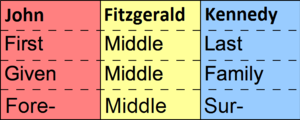
Back Van Afrikaans اسم العائلة Arabic Icinikasowin ATJ Soyad Azerbaijani سویآد AZB Фамилия Bashkir Pavardie BAT-SMG Apelyido BCL Прозвішча Byelorussian Прозьвішча BE-X-OLD
This article needs additional citations for verification. (February 2023) |

A surname, family name, or last name is the mostly hereditary portion of one's personal name that indicates one's family.[1][2] It is typically combined with a given name to form the full name of a person, although several given names and surnames are possible in the full name. In modern times most surnames are hereditary, although in most countries a person has a right to change their name.
Depending on culture, the surname may be placed either at the start of a person's name, or at the end. The number of surnames given to an individual also varies: in most cases it is just one, but in Portuguese-speaking countries and many Spanish-speaking countries, two surnames (one inherited from the mother and another from the father) are used for legal purposes. Depending on culture, not all members of a family unit are required to have identical surnames. In some countries, surnames are modified depending on gender and family membership status of a person. Compound surnames can be composed of separate names.[3]
The use of names has been documented in even the oldest historical records. Examples of surnames are documented in the 11th century by the barons in England. English surnames began to be formed with reference to a certain aspect of that individual, such as their trade, father's name, location of birth, or physical features, and were not necessarily inherited. By 1400 most English families, and those from Lowland Scotland, had adopted the use of hereditary surnames.[4]
The study of proper names (in family names, personal names, or places) is called onomastics.
- ^ "Surname". Britannica. Archived from the original on 17 March 2023. Retrieved 11 April 2023.
- ^ "surname". Oxford Dictionaries. Archived from the original on 20 January 2017. Retrieved 3 October 2017.
- ^ Haas, Ann; Elliott, Marc N; Dembosky, Jacob W; Adams, John L; Wilson-Frederick, Shondelle M; Mallett, Joshua S; Gaillot, Sarah; Haffer, Samuel C; Haviland, Amelia M (1 February 2019). "Imputation of race/ethnicity to enable measurement of HEDIS performance by race/ethnicity". Health Services Research. 54 (1): 13–23. doi:10.1111/1475-6773.13099. ISSN 1475-6773. PMC 6338295. PMID 30506674.
- ^ "BBC – Family History – What's in a Name? Your Link to the Past". BBC History. Archived from the original on 20 September 2020. Retrieved 21 September 2020.